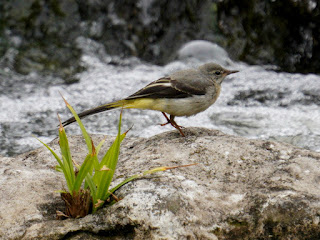The parent cooled off in the pool.
A female Blackbird at the bridge rummaged in dead leaves collecting insects and larvae to feed her young.
A Starling rushed around on the same task.
Most of the young Pied Wagtails are now independent and feeding themselves, and this one at the Lido was hunting efficiently.
But this parent on the lawn near the Dell still had work to do.
There was also a Grey Wagtail in the Dell, running along the rocks of the small waterfall ...
... and flying out to catch midges from the bottom of the large waterfall, here seen from the top.
The Little Owl was in her usual alder tree, hard to see among the leaves.
The Mute Swans on the Serpentine with three cygnets were guarding them while they ate some muesli that someone had put down.
The parents were in a foul mood, pecking at everything within reach. It seems that a Carrion Crow tried to catch a cygnet twice yesterday, though they failed both times.
The swans with six cygnets took them under the bridge and on to the Long Water, which was not a good idea ...
... as the swans with one cygnet were just the other side, looking defensive. The visitors quickly returned.
The dominant pair on the Long Water were still fussing around with their nest, but I couldn't see any sign of hatching when looking from across the lake.
A pair of Mallards worked their way down the edge of the shrubbery near the bridge looking for tasty plants and juicy bugs.
A Mandarin drake was going into eclipse, a sadly tatty sight. They spend half the year looking magnificent and half looking awful, unlike their mates who are quietly chic all the year round.
A Great Crested Grebe fished among the algae, which provide shelter for fish but don't protect them from a fast and agile predator.
A pair of Coots have built a nest in the traditional place on the buoys surrounding the Lido. Usually these nests get knocked off by swimmers or boats. The boats will return on 15 July, so they don't have enough time to produce a brood.













when are we going to see the first stripey heads? I am longing to see them.
ReplyDeleteWould the dominant pair at the LOng Water not having cygnets make them less belligerent?
Sometimes I am amazed that cygnets can be predated, unless it is a fox or a large dog. It must be hard to get past a swan.
There are two grebe nests on the go at present, but nothing to be expected for a fortnight or so. Our grebes breed very, perhaps uniquely, late.
DeleteYes, I think not having cygnets would make the dominant pair less belligerent, at least relative to the pair with one cygnet.
Apparently the crow sneaked up behind the swan, as crows do to other creatures, and snatched a cygnet from under its wing.